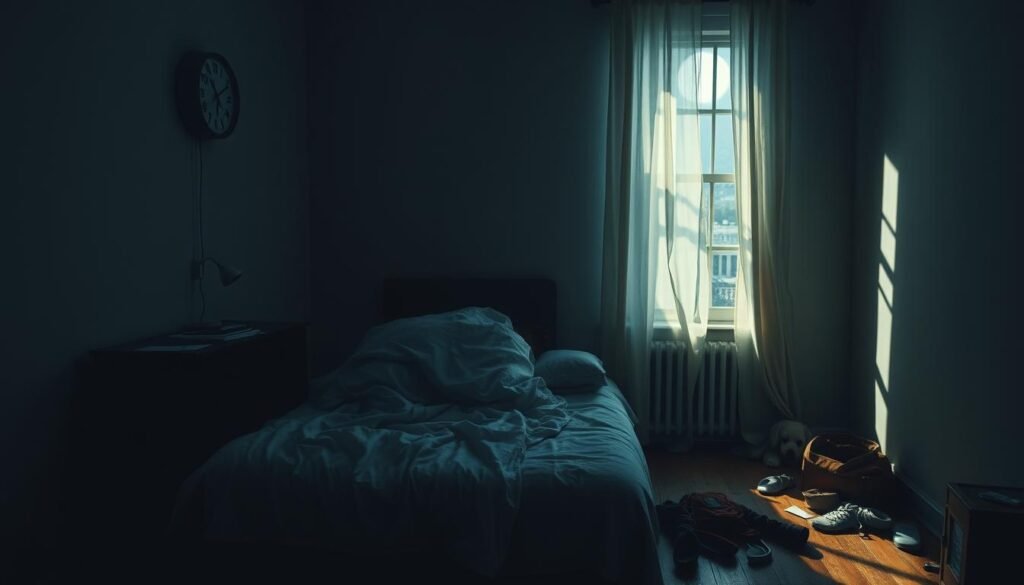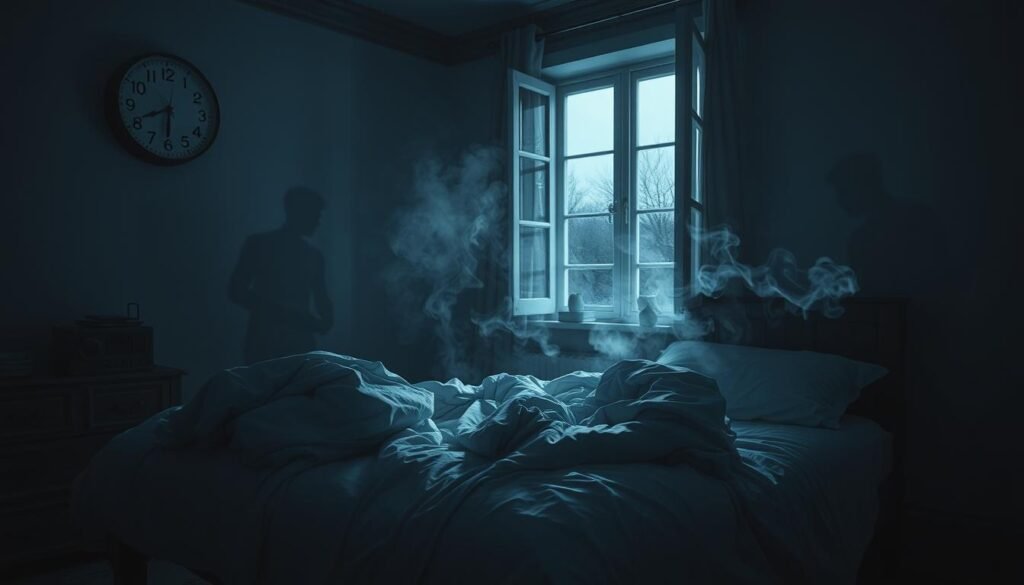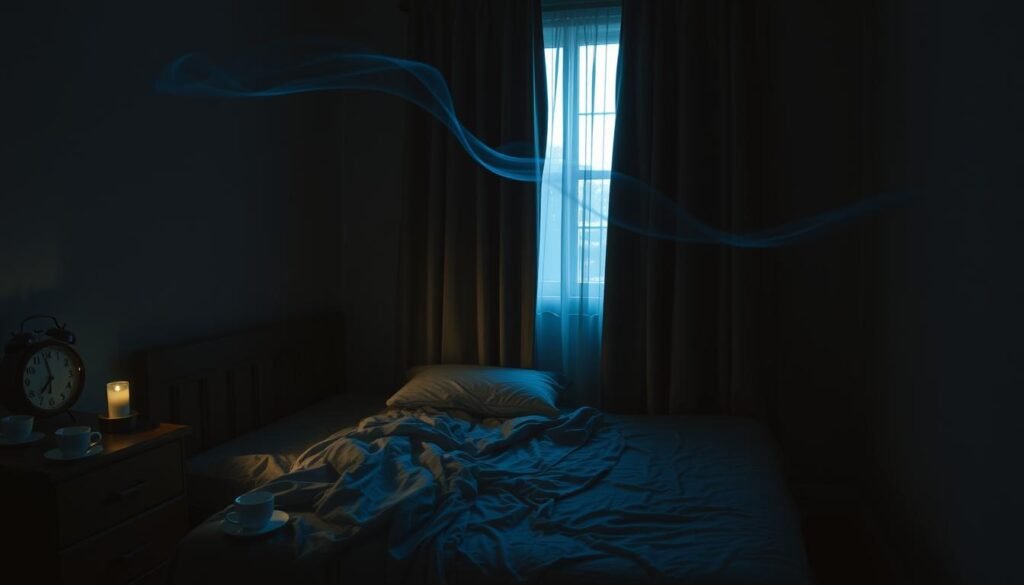Did you know that 16% of older adults start to show at least one sign of insomnia in six years? This comes from a study of 9,430 people aged 50 and up. It shows a deep yet often missed link between feeling lonely and how well we sleep. While many talk about social isolation, feeling lonely is what really messes with our sleep. Insomnia makes it hard to fall asleep, stay asleep, and causes early wake-ups. It’s often tied to feeling lonely. Now more than ever, it’s key to understand how loneliness, mental health, and our emotions connect.
Key Takeaways
- Loneliness is a big reason older adults may have insomnia symptoms.
- Studies show it’s loneliness, not being alone, that leads to sleep troubles.
- Lonely people in a study slept about 30 minutes less than others.
- Being lonely a lot can make blood pressure go up, causing more health problems.
- Doing social things or connecting with just one person can lessen the feeling of loneliness.
- Knowing how lack of sleep affects mental health is crucial for wellbeing.
- Dealing with loneliness might help people sleep better, which is important as we get older.
The Connection Between Loneliness and Sleep
Loneliness and sleep have a complex link. Loneliness can increase stress and anxiety, messing with sleep patterns. People who feel lonely often find their sleep quality drops. This can lead to symptoms of insomnia. When you don’t sleep well, it makes you feel worse overall.
Being lonely makes you feel more vulnerable. This can cause you to be overly alert of your surroundings. It’s harder to relax and sleep well because of this alertness. A major review looked at eleven studies on older adults. It found that over 71% with sleep problems felt socially isolated. This shows we need to tackle loneliness to help improve sleep. These studies used tools like the UCLA Loneliness Scale to understand loneliness better.
Getting involved in social activities helps fight loneliness. Being part of a group or keeping up with friends can make you feel better and sleep better. There’s a clear connection between how we feel emotionally and how well we sleep. Learning from these studies shows why it’s key to handle loneliness. It helps make mental health and sleep better. To learn more about mental health and insomnia, check out this guide.
Understanding Insomnia and Its Symptoms
Insomnia deeply affects our sleep and well-being. It’s key to know its symptoms, as they can differ for each person. Trouble sleeping is serious. It can harm our physical and mental health.
Common Symptoms of Insomnia
Finding out if you have insomnia is the first step to getting help. The usual signs are:
- Difficulty falling asleep
- Frequent awakenings during the night
- Waking up too early in the morning
- A feeling of nonrestorative sleep
These issues can lead to daytime tiredness, moodiness, and trouble focusing. They might also make feelings of loneliness worse. This is especially tough for those who already feel isolated.
Different Types of Insomnia
Knowing the types of insomnia helps in finding the right treatment. There are two main categories:
| Type of Insomnia | Duration | Frequency |
|---|---|---|
| Acute Insomnia | Short-term | Occurs less than three times a week |
| Chronic Insomnia | Long-term | Occurs at least three times a week for a month or more |
Chronic insomnia sufferers often have worse symptoms. Meanwhile, acute insomnia might start with stress or routine changes. Understanding these differences is vital. It helps us deal with deeper issues like stress or loneliness, improving sleep.
Can Loneliness Cause Insomnia?
Loneliness has become a big cause of insomnia. Studies show a strong link between feeling lonely and not sleeping well. People who feel lonely often feel more stressed and anxious. This can make emotional health worse and lead to not sleeping enough.
Research shows lonely people may have almost double the chance of showing insomnia symptoms. About 15% of people in studies have trouble falling asleep. And 11.7% find it hard to stay asleep. Also, 14.1% wake up too early. These facts show how much loneliness affects sleep quality.
The link between loneliness and insomnia is stronger in some groups. Socially isolated individuals often come from minority backgrounds. They may have less education and lower incomes. They also may have more health issues and feelings of depression. When health is taken into account, the strong link between being socially isolated and having insomnia gets weaker. This shows we need to find specific ways to help.
Many studies have found that nearly half of older adults, those 65 and above, have insomnia symptoms. For these people, loneliness strongly connects to problems with starting or keeping sleep. What matters most is having meaningful social connections, not just having many friends.
Knowing more about loneliness and insomnia helps us find ways to sleep better. By dealing with loneliness, people can get better sleep. This makes their overall mental health better too. For more information, look at a detailed study done by King’s College London. It backs up the link between these issues. Learn more here.
The Impact of Social Isolation on Sleep Quality
Understanding how social isolation affects sleep is key to improving mental health. Social isolation means having few interactions with others. Loneliness, however, is feeling alone no matter how many people are around. Though different, they often go hand-in-hand, impacting sleep. Studies show that both can make sleep worse.
Defining Social Isolation and Loneliness
Social isolation affects sleep quality discussions a lot. It happens when someone doesn’t interact much with others, causing stress. On the other hand, loneliness means feeling disconnected, even when you’re not alone. It’s useful to understand the difference between the two. Things like moving or getting divorced can make loneliness worse, hurting sleep.
The Role of Social Engagement in Sleep Health
Being socially active is key for good sleep. People active in their communities usually sleep better. Joining groups or volunteering helps fight loneliness and makes you feel included. This can improve how well you sleep. Often, minority groups have fewer social ties, which can affect their sleep. More social contact can boost emotional health and sleep quality.

| Factor | Impact on Sleep Quality |
|---|---|
| Social Isolation | Decreased sleep efficiency and increased risk of sleep disorders |
| Loneliness | Link to poorer sleep quality and emotional distress |
| Social Engagement | Associated with improved sleep patterns and quality |
| Life Events (moving/divorce) | Elevated risk of loneliness impacting sleep |
| Community Interaction | Better overall sleep health and emotional support |
Age-Related Factors in Loneliness and Sleep
As people age, they often see changes in how they connect with others. This can deeply affect their sleep. Studies show that older folks feel lonelier, which makes their sleep worse. Looking into how aging and loneliness affect sleep is key.
Effects on Older Adults
Research shows a strong connection between feeling lonely and not sleeping well among older adults. In Shandong Province, China, many elders said they felt very lonely, which made their sleep troubles worse. This loneliness can lead to depression and heart problems. It’s serious because loneliness causes body changes, like more cortisol, that make sleeping hard. This shows why staying emotionally connected is vital for older people’s sleep.
The Decrease of Social Networks with Age
As people get older, they often have fewer friends because of various reasons. These include losing loved ones or stopping work. Having fewer friends can make them feel isolated and more lonely. In rural China, more than one-third of older adults feel very lonely. This sadness is strongly linked to not sleeping well. It’s a cycle where loneliness and sleep issues make each other worse. Keeping up with friends can lessen loneliness and its bad effects on sleep.
How Stress and Anxiety Influence Sleep
Stress and anxiety can really change how well you sleep, leading to stress-related insomnia. It’s been found that over half of Americans had sleep problems during the pandemic. This was due to more stress. Anxiety and sleep problems feed off each other, making it hard to get good rest. Stress keeps your mind alert and disrupts your normal sleep pattern.
The Link Between Stress and Insomnia
Research shows one in three adults have insomnia symptoms because of stress. Stress from life’s challenges can cause these insomnia symptoms. Problems like issues at work or worrying about money can trigger sleep troubles. Not sleeping enough can make anxiety worse. This creates a harmful cycle hurting your mental health.
Addressing Mental Health for Better Sleep
To break this cycle, handling stress properly is important. Techniques like cognitive behavioral therapy for insomnia (CBT-I), meditation, and exercise can reduce stress. They also make sleep better. Getting help from friends or professionals can lower anxiety too. This helps you sleep well. To better understand how stress affects sleep, check out more information here.

Research Insights on Loneliness and Sleep Deprivation
Recent studies reveal a deep link between loneliness and sleep loss. Lonely people often sleep about 30 minutes less than those who feel supported. This lack of sleep can cause serious health problems like obesity and high blood pressure.
Key Findings from Recent Studies
A survey among college students showed 35% felt very lonely. These lonely students had twice the insomnia symptoms as their peers. The study found loneliness predicts insomnia better than how much screen time students had.
In addition, the U.S. Centers for Disease Control and Prevention reports that over a quarter of college students suffer from insomnia. A worldwide review found 18.5% of college students have insomnia symptoms. This is compared to 7.4% of similar-aged non-students.
The Relationship Between Mental Health and Sleep
There’s a clear link between mental health and how well we sleep. Poor sleep can make feelings of loneliness worse and is linked to more anxiety and depression. Tackling mental health issues can improve sleep health.
Loneliness can prevent the deep sleep we need, making mental and sleep problems worse. But, building close relationships and community support can boost well-being and sleep quality. This shows how health and sleep are deeply connected.
Exploring Loneliness as a Health Concern
Loneliness is more than feeling isolated. Various studies show it seriously affects our health. Knowing this can help us see why it’s vital to tackle loneliness to get better health results.
Effects of Loneliness on Physical Health
The health risks of loneliness are big. It’s linked with serious conditions like heart disease and diabetes. A major review in 2017 found that not having enough social contact raised the risk of dying early.
Young people are also at risk. Those who are very lonely may have high cholesterol and feel very stressed. This shows we need to keep a close eye on loneliness because it can make physical health worse and worse.
The Psychological Impact of Loneliness
Loneliness hits our emotional health hard. People who are very lonely often feel more anxious or depressed. A study found that those who couldn’t sleep well because of loneliness had a higher chance of thinking about suicide.
This problem can also make it hard to sleep well, which makes emotional issues even worse. By dealing with loneliness, we can help improve mental health. This could also help people handle mental health problems better in the long run.

Insomnia Remedies and Coping Strategies
Finding the right remedies for insomnia can make your sleep better. This is especially true for those dealing with anxiety or health issues. One popular treatment is Cognitive Behavioral Therapy for Insomnia (CBT-I). It’s often the top choice for chronic sleep problems. CBT-I helps by changing negative thoughts about sleep and teaching good sleep habits. It also focuses on activities that increase social interaction and reduce loneliness.
Behavioral Techniques for Better Sleep
Behavioral methods are key to improving sleep. CBT-I works well for many types of insomnia, whether caused by habits or health problems. It usually takes 6 to 8 sessions to learn and perfect these techniques. Over time, most people see lasting improvements in their sleep, without the side effects of sleeping pills. Getting familiar with these strategies helps people manage their sleep better on their own.
Mindfulness and Relaxation Techniques
Mindfulness and relaxation methods can boost emotional health and sleep quality. Practices like deep breathing, muscle relaxation, and guided imagery set the stage for a restful night. Using these techniques regularly reduces anxiety and improves how we handle insomnia and loneliness. For detailed advice, visit this resource.
The Importance of Sleep Hygiene
Improving sleep hygiene is vital for people feeling lonely or sleeping poorly. A proper sleep routine can greatly help. It creates a setting that’s good for sound sleep. Setting a regular sleep time gets the body’s clock in sync. This leads to better sleep and can ease insomnia.
Establishing a Sleep Routine
Building routines with set sleeping and waking times is key to better sleep. These patterns can greatly improve your rest at night. Studies show that lonely people often sleep badly. A strict sleep schedule boosts health and fights loneliness. It promotes good sleep hygiene too.
Creating a Sleep-Inducing Environment
To sleep well, the environment matters. A room that’s dark, cool, and comfy helps you fall asleep faster and stay asleep. Making these small changes can lead to deeper sleep. This is especially important for those feeling disconnected. A good sleep setting fights the downsides of loneliness and aids mental health.
Interested in how lack of sleep affects social life? UC Berkeley’s research offers deep insights. Learn more about sleep and social life here.